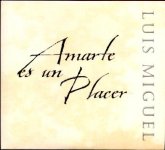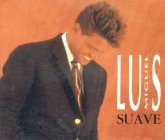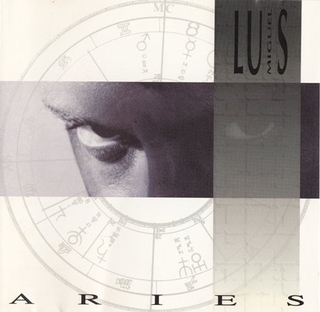
Luis Miguel Gallego Basteri is a Mexican singer and record producer. Born in Puerto Rico to an Italian mother and a Spanish father, he is often referred to as El Sol de Mexico, derived from the nickname his mother gave him as a child: "Mi sol". Luis Miguel has sung in multiple genres and styles, including pop songs, ballads, boleros, tangos, jazz, big band, and mariachi. Luis Miguel is also recognized as the only Latin singer of his generation not to cross over to the Anglo market during the "Latin Explosion" in the 1990s.

Mexican recording artist Luis Miguel has released 21 studio albums, 30 compilation albums, three extended plays (EP) two live albums, two soundtrack albums and five box set. Luis Miguel has sold over 60 million records, making him one of the best-selling Latin music artists of all time. Luis Miguel is also the artist with the second-most number ones on the Billboard Top Latin Albums chart with nine albums. At the age of 11, he released his debut studio album, Un Sol (1982), which was certified platinum and gold in Mexico. The artist would release four more studio albums under the record label EMI: Directo al Corazón (1982), Decídete (1983), También es Rock (1984), and Palabra de Honor (1984). A Portuguese-language version of Decídete and Palabra de Honor were released in Brazil as Decide Amor and Meu Sonho Perdido, respectively. Luis Miguel made his acting debut in the film as the lead role on Ya nunca más (1984) and recorded its soundtrack. In 1985, he participated in the Sanremo Music Festival 1985 with the song "Noi ragazzi di oggi"; it placed second in the Big Artist category and was later included on the Italian-language edition of Palabra de Honor. In the same year, Luis Miguel recorded the soundtrack for the film Fiebre de amor, which he co-starred with fellow Mexican singer Lucero.

Romances is the twelfth studio album by Mexican singer Luis Miguel, released on 12 August 1997, by WEA Latina. It is the third album of the Romance series, in which Luis Miguel covers Latin songs from 1940 to 1978. Aside from Luis Miguel, the production also involved arranger Bebu Silvetti, and Armando Manzanero, who directed all of Luis Miguel's Romance albums. Romances consists of twelve cover versions and two new compositions by Manzanero and Silvetti. Recording took place in early 1997 at the Ocean Way recording studio in Los Angeles, California.

Romance is the eighth studio album by Mexican singer Luis Miguel. It was released by WEA Latina on 19 November 1991. Although the production was originally intended as another collaboration with Juan Carlos Calderón, that plan was scrapped when Calderón was unable to compose songs for the album. Facing a new-material deadline in his recording contract, at his manager's suggestion Miguel chose bolero music for his next project. Mexican singer-songwriter Armando Manzanero was hired by WEA Latina to co-produce the album with Miguel. Recording began in August 1991 at Ocean Way Recording in Hollywood, California, with Bebu Silvetti the arranger.

Segundo Romance is the tenth studio album by Mexican singer Luis Miguel, released on 30 August 1994 through WEA Latina. Like Luis Miguel's 1991 album Romance, Segundo Romance comprises cover versions of boleros written between 1934 and 1993. It was produced by Luis Miguel with Juan Carlos Calderón, Kiko Cibrian and Armando Manzanero and recorded in early 1994 at the Record Plant in Los Angeles.

Un Pedacito De Mi is the fourth album from Mexican pop music singer and actress Lucerito. It was released on 1986. In this album, it can be found the collaboration of the popular Mexican singer Luis Miguel with the song "Todo el Amor del Mundo", which was part of the soundtrack of the motion picture Fiebre de amor.

The Hunchback of Notre Dame: An Original Walt Disney Records Soundtrack is the soundtrack to the 1996 Disney animated film The Hunchback of Notre Dame. It includes songs written by Alan Menken and Stephen Schwartz with vocals performed by Paul Kandel, David Ogden Stiers, Tony Jay, Tom Hulce, Heidi Mollenhauer, Jason Alexander, Mary Wickes, and Mary Stout, along with singles by All-4-One/Eternal, and the film's score composed by Alan Menken.

"Amarte Es un Placer" is a song recorded by Mexican singer Luis Miguel and the fourth and final single from his album of the same name (1999). Released in 2000, it was written by Juan Carlos Calderón, while production was handled by Miguel. Lyrically, "Amarte Es un Placer" deals with a narrator describing the pleasures of being enamored with his lover.

Nada Es Igual is the eleventh studio album by Mexican recording artist Luis Miguel. It was released by WEA Latina on 20 August 1996. The album has a musical style similar to his previous pop album Aries (1993) on which Miguel performs power ballads and R&B tunes. Recording took place at the Record Plant Studios in February 1996, with production handled by Miguel and his longtime associate Kiko Cibrian. Its songwriting was assisted by Cibrian, Rudy Pérez, and Alejandro Lerner. The album was promoted by three singles: "Dame", "Cómo Es Posible Que a Mi Lado", and "Que Tú Te Vas"; the former became the most successful single reaching number two and number one on the Billboard Hot Latin Songs and Latin Pop Songs charts, respectively. To further promote the recording, Miguel launched the Tour America 1996 where he performed in several South American countries.

Grandes Éxitos is a greatest hits album by Mexican singer Luis Miguel. Released on 22 November 2005 by Warner Music Latina, the album features 24 previously recorded songs from Miguel's career with his record label as well as two new songs ; both songs were released as singles from the album. A special edition of the record was also released and features six extra songs as well as a DVD containing music videos from Miguel's career. Grandes Éxitos received a favorable review by AllMusic critic, Thom Jurek who commended Miguel's trajectory as an artist. Commercially, it reached number one in Mexico and the top ten in Argentina, Spain, Portugal, and the Billboard Top Latin Albums chart in the United States. It was certified Multi-Platinum in Mexico and the United States (Latin) and Platinum in Spain.

Cómplices (transl. Accomplices) is the 18th studio album by Mexican singer Luis Miguel, released on 2 May 2008 by Warner Music Latina. The record is a collaboration with Spanish musician Manuel Alejandro, who wrote and arranged the songs, and co-produced the album with Luis Miguel. Musically, it is a pop album of mostly ballads and a few uptempo tracks with lyrics emphasizing romance. Two singles were released to promote the album: "Si Tú Te Atreves" and "Te Desean". To further promote the record, Luis Miguel embarked on the year-long Cómplices Tour from September 2008 to September 2009. He performed in North America and a few countries in South America.
"Entrégate" is a pop song written, produced and arranged by Juan Carlos Calderón, and performed by Mexican singer Luis Miguel. It was released as the second single from his Grammy Award nominated studio album 20 Años (1990), and became his fifth number-one single in the Billboard Top Latin Songs chart. The parent album became commercially successful, with sales records throughout Latin America, with six of its singles entered the charts in Mexico simultaneously. After its release, Miguel was recognized as the leading male vocalist in Latin America.
"Someday" is a song from Disney's 1996 animated feature film, The Hunchback of Notre Dame. It was written by composer Alan Menken and lyricist Stephen Schwartz and originally recorded by American singer and actress Heidi Mollenhauer in her film role as the singing voice of Esmeralda. It was one of three recordings, along with "In a Place of Miracles" and "As Long as There's a Moon", that were discarded during the storyboarding process to be replaced by "God Help the Outcasts." The codirectors Gary Trousdale and Kirk Wise both desired a quieter song for Esmeralda's scene inside the Notre-Dame de Paris cathedral.

"Hasta Que Me Olvides" is a song by Mexican singer Luis Miguel from his ninth studio album, Aries (1993). The song was composed by Dominican Republic singer-songwriter Juan Luis Guerra with Miguel and Kiko Cibrian handling the production. It was released as the album's second single in August 1993 by WEA Latina. A sentimental ballad, the song narrates the protagonist who insists on loving his partner until he is forgotten.

"Suave" (transl. "Smooth") is a song by Mexican singer Luis Miguel from his ninth studio album, Aries (1993). The song was composed by Kiko Cibrian and Orlando Castro with the former handling its production along with the artist. It is a dance number in which the singer describes a woman who bewitches him and becomes the woman of his dreams. The song received positive reactions from two music critics. It was acknowledged as an award-winning song at the 1995 Broadcast Music Inc. (BMI) Latin Awards. Commercially, the song reached number nine on the Billboard Hot Latin Songs chart in the United States. Its music video was directed by Kiko Guerrero and filmed in Acapulco, Mexico, and features Miguel dancing in a beach with several women.

Luis Miguel: The Series is a Spanish-language American biographical television series produced by Gato Grande Productions along with MGM Television for Netflix and Telemundo. It is an authorized version on the life of the Mexican singer Luis Miguel. It stars Diego Boneta as the titular character. Filming began on November 16, 2017.

¡México Por Siempre! is the 20th studio album by Mexican singer Luis Miguel. Released on 24 November 2017 via Warner Music Mexico, it is his second full-length mariachi album following México en la Piel (2004). The album was produced solely by Luis Miguel, with instrumentation done by mariachi ensemble Vargas de Tecalitlán.

The México Por Siempre Tour was a concert tour by Mexican singer Luis Miguel in support of his 20th studio album ¡México Por Siempre!.

"Ayer" (transl. "Yesterday") is a song by Mexican singer Luis Miguel from his ninth studio album, Aries (1993). Miguel and Kiko Cibrian handled the song's production. It was released as the album's lead single on 17 May 1993 by WEA Latina. It is a Spanish-language adaptation of David Foster's instrumental "All That My Heart Can Hold" with lyrics written by Rudy Pérez. A sentimental ballad, the song conveys the singer's pride and pain of his frustrated dreams. Three music videos for the song were filmed at the Longoria Mansion in Mexico City and were nominated for Video of the Year at the Premio Lo Nuestro 1994. The ballad received positive reactions from music critics who favorably compared it to the ballads of his previous studio album, Romance (1991).

















